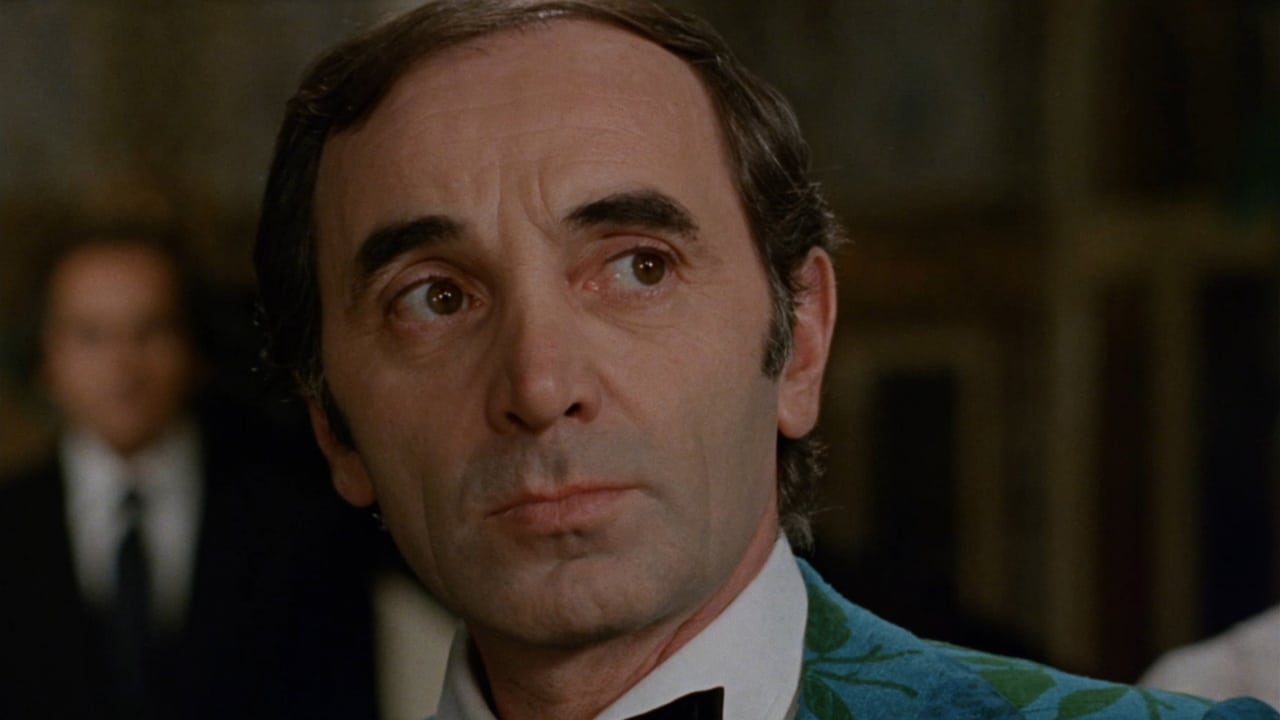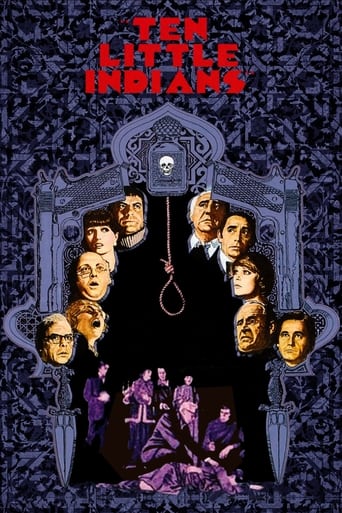Perry Kate
Very very predictable, including the post credit scene !!!
SpecialsTarget
Disturbing yet enthralling
TeenzTen
An action-packed slog
Derry Herrera
Not sure how, but this is easily one of the best movies all summer. Multiple levels of funny, never takes itself seriously, super colorful, and creative.
Cheese Hoven
The 1970s saw a large number of "all star cast" versions of Agatha Christie classics. These are all, I think, mediocre adaptations, Ten Little Indians being no exception. The general problem with all these adaptations is the profusion of big name actors, chosen for their box office appeal rather than any chemistry they may have with each other.A distinct lack of chemistry is very evident here as well as a tendency (typical of when big egos are put together) to try and out act each other. Some of this is no doubt due to the indigestible nature of the dialogue which is apparent lifted completely from 1966 film version which is in turn derived from Christie's inferior pot-boiling stage play rather than the original novel.Then there are the excessive pauses between each person's dialogue. This is heightened by the filming in large echoey rooms which leads to a large amount of "dead air". Curiously although there is a soundtrack, it does not cover these pauses. Indeed the music is one of the embarrassments of the film, cliché ridden and inappropriate. Another problem with the big echoey rooms, is that it renders some of the dialogue indistinct, especially from those with heavy accents. Dickie attenborough's final flutter of "Two..little..Indians?", appropriately enough with a very red face, sums up this embarrassment.
Leofwine_draca
Harry Alan Towers, producer of schlock and international adventure on a low budget, is the man behind this reworking of the Agatha Christie novel, alternatively titled AND THEN THERE WERE NONE. It's a highly simplistic murder mystery, about a group of disparate types being bumped off one by one, so Towers goes all out in an attempt to attract audiences.He does this by assembling an ensemble cast of famous faces. You get a typically tough Oliver Reed as the heroic lead, and Elke Sommer as his love interest. In support we're handed the likes of Richard Attenborough and genre stalwart Herbert Lom playing against no less than two former Bond villains in Gert Froebe and Adolfo Celi. If that wasn't enough, there's a minor role for Euro crumpet Maria Rohm and some voice work for no less than Orson Welles.Directorial duties are handled adroitly by Brit director Peter Collinson, responsible for Michael Caine classic THE Italian JOB and Hammer psycho-thriller STRAIGHT ON TILL MORNING amongst other flicks. And it's a well paced and fairly mysterious affair, strong on predictability but also atmosphere and style. It's not a film that's going to win awards or anything, but it's definitely worth a watch.
mattbaxter72
This is an adaptation of a work by Agatha Christie, although without many of her usual trademarks - no smarmy Belgians or pottering old ladies here, just ten nasty people trapped in a hotel in the middle of nowhere, being killed off one by one. The killer is among them, but who is it? Well, apart from the fact that the director likes giving long close-ups of one particular character for no obvious reason, a better answer might be - who cares? They're all nasty pieces of work, quite a few can't act for toffee, so kill 'em all, I say.As if that isn't bad enough, the characters tend to speak solely in long chunks of exposition, and the whole thing is directed and written by people who clearly take 'plodding' to be a compliment. The worst of it, though, is that the characters in this suffer from a terminal case of passing the idiot ball. Hey, we're in a mysterious house where we're being killed off one by one - let's split up! And then explore the dark basement! What could possibly go wrong? Let's wander out into the ruins, alone! Or into the desert, wearing a heavy overcoat and carrying one small bottle of water! Not exactly for the first time in a movie like this, I felt the characters were only behaving this way because the plot told them to, and most were so stupid they deserved to die.Oh, it's not irredeemably bad - with a cast like this, how could it be? But the actors, clearly hired from the Utterly Random Casting Agency, aren't given enough to do, or enough freedom to properly ham it up. As each character is killed, you expect them to show at least a little emotion, but mostly they just look like a bunch of actors waiting on a cheque.It takes until the third death before someone says 'This isn't a game any more.' Perhaps if someone had been bright enough to realize that fact after the FIRST person was murdered, I wouldn't have been wishing so fervently for them all to get killed.
avezou1
... or rather a nightmare.******* SPOILERS ***************************** Some reviewers emphasize the apparent logic flaws of the script, and they're right: why did the guests accept that crazy invitation, why can't they organize themselves properly to survive or pay attention to the (very spare) clues they have, why does Mr Owen leaves some deaths (Martino's, Ilona's and the expected Lombard's death) to excessive chance, why do the guests accept so easily the fact there's no-one else in the house... OK.The guests' behaviour is sometimes far from logic, indeed, but these people make the experience of TOTAL FEAR, a feeling new to them. And fear paralyzes thought. If Armstrong had thought twice, he wouldn't have been influenced by the judge's remark about lights being constantly switched on and off which means they're both innocent. That remark doesn't prove anything, but we know that because we're sitting comfortably in our chair, while the doctor is sweating like a pig and begs the judge to spare him if he's Mr Owen. All characters end up acting like beasts in a trap. They sweat, they plead, they become violent, but they never think. They're as despicable as in the novel, and very well played by all for that reason.The only character who sits back before it's too late and re-thinks all the story over is Morley / Lombard. In the end he's got 3 seconds to find a plausible explanation, and does so. The rest of the guests are doomed from the beginning - or they think they are.That's why things are so easy for Mr Owen all the way through.Every character experiences the ultimate nightmare: the one which happens in real life. All the more that Mr Owen seems to be some sort of God, an almighty, elusive son of a b...: he sees Martino dying in the desert, he knows exactly where the General is in the ceiling (and that Ilona's not with him anymore), he pours cyanide in Raven's glass and lets him live long enough to confess his hideous crime... He's the eye in the sky, and the mouse under the bed in the same time. Take the camera angles: they suggest that someone is alternatively watching from above and below. The camera is rarely at the characters' level. This is no 70s' gratuitous gimmick, it's here for a reason. Mr Owen is no real being, he's the dust under the carpet, he's the walls, he's the ruins outside. He's everything, everywhere.Like a false God. But too self-assured, too confident in his abilities, in the superiority of his mind. He neglects the final step of his scheme and doesn't care to watch through Morley's shooting by Vera Clyde. What a mistake.Mr Owen doesn't exist, he's just a symbol of evil. A superior evil: bright, cold-blooded, paranoid, bloodthirsty. An enemy of mankind in the vein of Hitler, only to a lesser scale.The place where all the story takes place doesn't exist either: a 50-rooms palace in the middle of the desert, with no road, no life hundreds of miles around? Well...If you're not convinced, think of all the gaps that were not filled by the director - on purpose. What was the mysterious way of escape Martino was searching? How did Mr Owen made his way through the house without never being seen or heard? What story will the two survivors tell the police when it arrives: the truth (with what proof?)or will they invent a new story, accusing one another so that no-one will be able to incriminate any of them (good luck!)? All these points are not explained. Flaws? Who thinks Peter Collinson was dumb enough not to realize these flaws would show? They are here to suggest the viewer that he's not just watching another whodunit, but some surrealistic drama. Think about it, when you wake up in the morning, can you make perfect sense to all the dreams you made? Isn't it more important to analyze the impression they left on you? Like in the best giallos, some points remain blurred, some mechanisms are unclear, but it's not the point. We're not talking about logic here, we're talking about human weaknesses. A recurrent theme in Peter Collinson's movies, never treated as efficiently as in this first-rate chiller.

